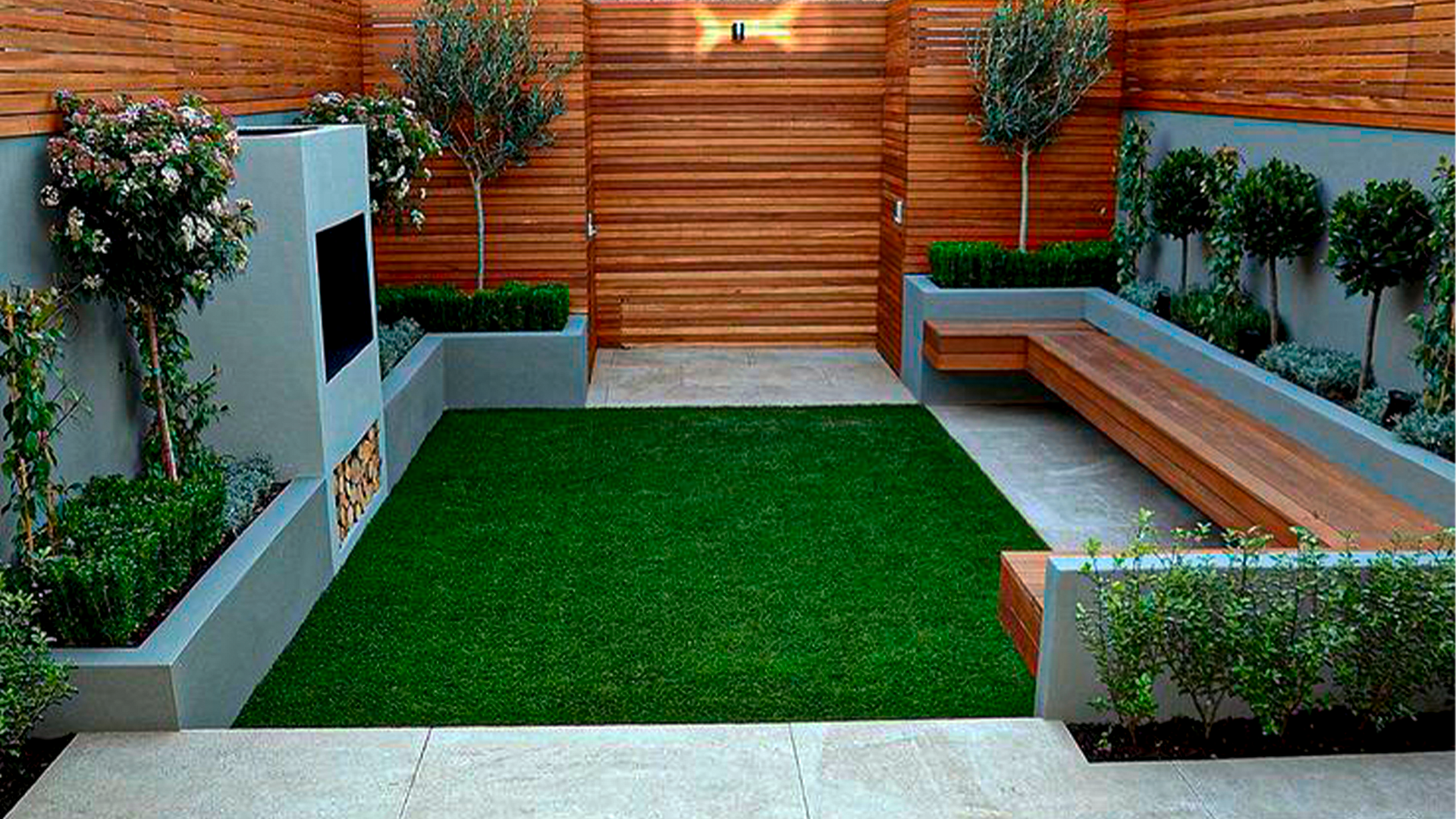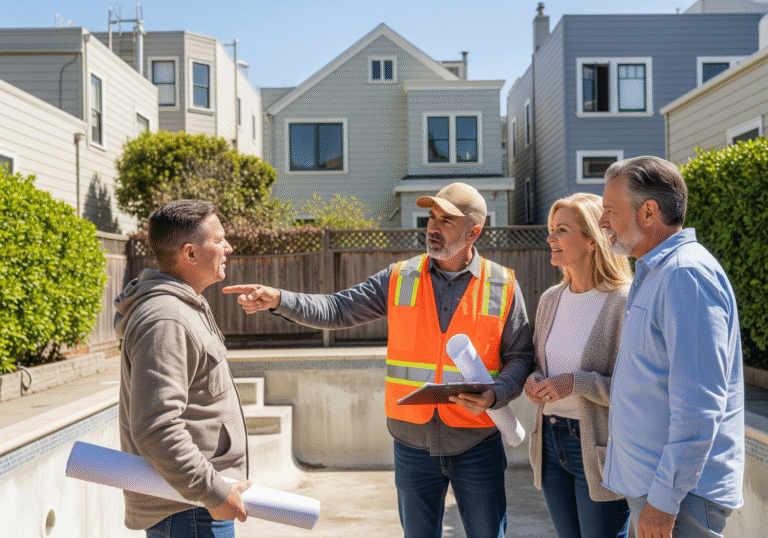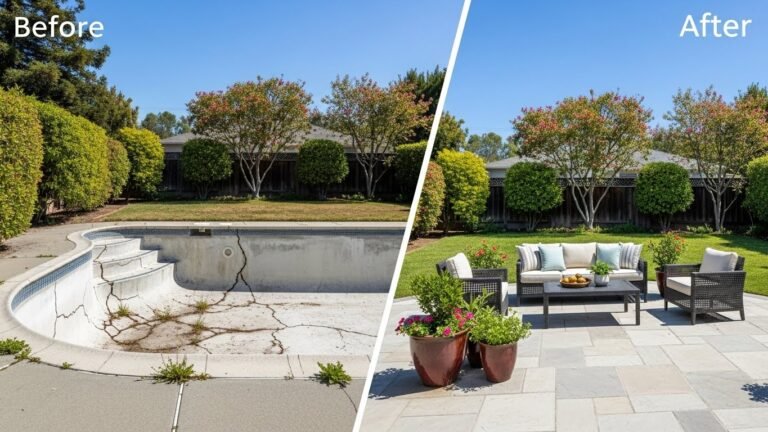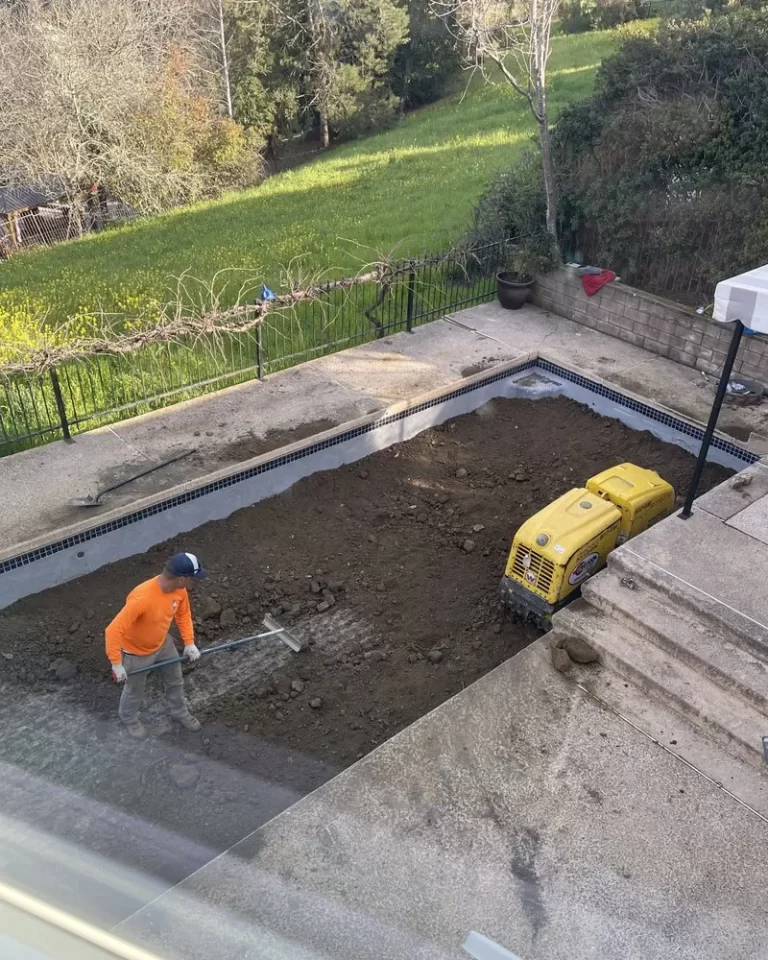Embracing Minimalism: The Rise of Pool-Free Living
Minimalism is more than just a trend; it’s a lifestyle choice that many homeowners are embracing. With an emphasis on quality over quantity, people are rethinking their living spaces. A growing number are choosing to remove their pools, seeing them as unnecessary clutter in their pursuit of a minimalist lifestyle.
Pools, once considered symbols of luxury, can often become burdensome. Maintaining them requires time, effort, and resources, which can contradict the minimalist principle of simplifying life. In exchange for the removal of a pool, homeowners often gain valuable space that can be repurposed for activities that bring true joy and satisfaction.
This shift towards minimalism encourages a focus on what truly matters. By saying goodbye to pools, homeowners are opting for more meaningful and practical uses of their space. This change not only simplifies their lives but also allows them to invest in experiences and items that hold more personal value.
The Rise of Minimalism
Minimalism is gaining popularity as people choose simplicity over excess. Homeowners are letting go of possessions, like pools, to focus on what truly matters.
Defining a Minimalist Lifestyle
A minimalist lifestyle centers on living with less and valuing simplicity over material wealth. It encourages people to keep only items that serve a purpose or bring joy. This lifestyle challenges consumerism, urging individuals to make intentional decisions about their possessions.
Minimalists focus on quality over quantity. They may live in smaller homes, own fewer clothes, and reduce their digital clutter. The goal is to eliminate distractions, allowing space for meaningful experiences and relationships. As minimalism spreads, it reshapes traditional values by promoting sustainable and intentional living.
Historical Context and Modern Adoption
Minimalism has roots in various historical movements like Buddhism, which values detachment from material goods. In the 1960s, minimalist art highlighted simplicity and essential forms. This cultural influence began to shape lifestyles as well.
In recent years, the minimalist trend has grown with the rise of books and documentaries. Influencers and authors promote decluttering and mindful consumption. Social media amplifies these ideas, encouraging more people to adopt minimalist practices.
Economic shifts also affect this trend. People reconsider spending habits in response to financial uncertainties. This makes minimalism attractive as a practical lifestyle choice, emphasizing living within means and focusing less on possessions.
Decluttering for Well-Being
Embracing a clutter-free space can bring joy and enhance mental health. By letting go of unnecessary items, people may find improved well-being and reduced anxiety levels.
Psychological Benefits of Less
Clearing out clutter can lead to tangible improvements in mental health. Without piles of unused items, spaces feel more open and inviting. This openness can lead to feelings of calm and contentment. Reduced clutter can lead to lower anxiety levels since there’s less chaos to manage. This newfound simplicity often boosts happiness.
With fewer distractions, relationships also benefit. People spend more quality time connecting with others instead of managing their belongings. As they focus on what truly matters, individuals may find a sense of harmony both at home and in their interactions.
Decluttering as a Method for Stress Reduction
Decluttering is a powerful tool for reducing stress. By organizing and simplifying their surroundings, individuals can create a more peaceful living environment. This organized space can feel like self-care, offering a retreat from the world’s chaos.
People often experience a sense of accomplishment after removing excess items. This can increase joy and satisfaction in daily life. An organized home means less time spent searching for lost items, leading to more free time and less frustration.
In living spaces free from clutter, individuals often find a renewed sense of focus and relaxation. This helps in managing everyday stress more effectively, promoting better overall well-being.
Redefining Value and Happiness
Homeowners are looking to find greater joy not through material things like pools, but through simpler living. They are focusing on real connections and memorable experiences, which brings a new way to view happiness and what truly matters.
Material Possessions vs. Experiences
Many people initially think that having more things will lead to happiness. Owning a pool, for example, may seem like a luxury. Yet, maintaining it requires time and money, which can dim its appeal. Experiences, in contrast, often provide longer-lasting happiness. They create cherished memories without the ongoing hassle of upkeep.
When homeowners let go of pools and similar possessions, they often find that they have more time and resources for experiences. A weekend camping trip or a family outing can bring more joy than cleaning a pool. This shift to valuing experiences over things leads many towards a minimalist lifestyle.
The Role of Relationships and Community
Relationships play a critical role in genuine happiness. Homeowners embracing minimalism often prioritize connections with family and friends more than ever. Without the distractions of maintaining a pool, there’s more time for meaningful interactions. This can make a tight-knit community even stronger.
Being part of a community can provide a deep sense of belonging and purpose. Moving away from material possessions allows people to focus on building and strengthening these bonds. Shared moments, whether in community events or simple gatherings, become treasures. Such interactions form a supportive network and bring a sense of fulfillment beyond what any material object can offer.
Environmental and Financial Impacts
Saying goodbye to pools is not just about reducing space. It involves environmental responsibility and economic benefits. Homeowners find that downsizing aligns with sustainable living while simultaneously offering significant financial savings.
Minimalism and Environmental Responsibility
Embracing minimalism often leads to a smaller carbon footprint. Maintaining a pool requires large amounts of water, electricity for filtration, and chemicals for cleaning. This can affect local water resources and cause pollution. By eliminating pools, homeowners can reduce their environmental impact and contribute to sustainable living.
Natural habitats in yards can flourish without the use of pool chemicals. This choice supports local wildlife and promotes a more natural landscape. Encouraging the use of native plants or even vegetable gardens in place of pools further enhances environmental benefits.
Economic Advantages of a Minimalist Approach
For many, saving money is a key reason to remove a pool. Pools require ongoing maintenance, including cleaning and repairs, which can be costly. Homeowners save on water, electricity, and pool chemicals. Those funds can be redirected toward other home improvements or savings.
Additionally, insurance premiums for homes with pools can be higher, due to liability concerns. Removing a pool may lower these costs. Downsizing and simplifying often lead to reduced expenses and less consumerism, creating financial freedom and easing budget pressures.
Implementing Minimalism in Daily Life
Living a minimalist lifestyle involves making conscious choices to embrace simplicity. It promotes the idea of “less is more” by reducing clutter and focusing on what truly matters. By integrating minimalism into daily routines, homeowners can create more functional and peaceful environments.
Creating a Capsule Wardrobe
A capsule wardrobe is a small collection of clothing that is versatile and purposeful. To start, individuals can sort through their clothes, keeping only what they truly need. Functionality and comfort are key factors, meaning each item should serve multiple purposes.
Choosing neutral colors and classic styles makes mixing and matching easier. Having fewer clothes means less decision fatigue in daily routines. It also saves time and money. Regularly revisiting and updating the capsule wardrobe ensures it remains useful and aligned with personal style.
Minimalism in Home Design and Décor
Minimalist home design focuses on simplicity and functionality. Every piece of furniture should serve a purpose, contributing to a clutter-free space. Clean lines and open spaces dominate minimalist décor, promoting a sense of calm.
Natural light is often embraced to make rooms appear larger and more inviting. Using a neutral color palette enhances the feeling of tranquility. Storage solutions are important to keep surfaces clear and organized. Minimalism in home design encourages conscious choices when selecting and placing items, ensuring each has a specific function.
Minimalist Routines and Habits
Minimalist routines help streamline daily life, making room for more meaningful activities. By cutting down on unnecessary tasks, individuals can focus on what truly matters. Simple habits, such as planning meals or setting daily priorities, can reduce stress and increase productivity.
Making conscious choices about how time and energy are spent promotes a balanced lifestyle. Adopting “less is more” into habits means valuing quality over quantity. Regular reflection on these routines encourages ongoing adjustments to ensure they align with minimalist principles.
The Challenge of Size: Tiny Homes and Spaces
Living in a tiny home requires creative use of space and a focus on essentials. Homeowners prioritize functionality and quality over adding more space and possessions.
Tiny House Movement: A Case Study in Minimalism
The tiny house movement began as a push towards minimalist living. People felt cluttered and tied down by large homes and excessive possessions. Tiny homes, often under 400 square feet, offer a way to embrace simplicity while reducing environmental impact.
Many opt for tiny homes to save money by cutting down on mortgage payments and utility bills. Small living spaces force residents to decide what truly matters, often leading to a happier, more fulfilling lifestyle. This movement teaches that less is more, with homeowners valuing experiences over things.
Designing for Functionality in Small Living Spaces
Creating a functional tiny home means maximizing every inch of space. Designers use clever storage solutions such as built-in shelves and hidden compartments. Foldable furniture and multi-use items help make rooms serve multiple purposes, making the space versatile.
Quality over quantity is key. Choosing high-quality, durable items that serve several functions is vital. Natural light and open interiors make the home feel larger. These techniques make tiny house living practical and comfortable, proving that smaller spaces can be both stylish and efficient.
Mindfulness and Self-Awareness
Mindfulness and self-awareness are key components of the minimalist lifestyle. They help individuals make conscious choices about keeping or removing items like pools to focus on what truly matters.
Practicing Mindfulness Through Minimalism
To practice mindfulness through minimalism, individuals focus on being present. Removing excess items means fewer distractions, helping them to enjoy each moment more fully. When homeowners remove pools, they create a space that is calmer and less cluttered.
This simplicity allows them to connect with their surroundings and spend their time and energy more meaningfully. Mindfulness encourages a sense of calm and well-being. It turns attention toward how each space and item in a home affects daily life. By focusing on the benefits of less, people can enhance their self-care routines and lead more balanced lives.
Self-awareness and Making Conscious Choices
Self-awareness plays an essential role in minimalism. It involves understanding personal needs and desires before making decisions. Individuals should consider their feelings, goals, and values when deciding to keep or remove items like pools. This process helps them ensure their surroundings align with their true selves.
By making conscious choices, individuals prioritize what is truly important in their lives. This mindful evaluation leads to thoughtful decisions about what to keep or let go of. It also fosters a deeper connection to their home environment, enhancing satisfaction and simplifying daily living. Through these conscious choices, a more fulfilling and intentional life can be achieved.
Choosing Privacy Over Public Display
Homeowners are increasingly valuing privacy over having flashy outdoor amenities. With growing interest in simple living, many are rethinking their outdoor spaces and deciding to say goodbye to large, invasive structures like pools.
Having a private space at home means enjoying tranquility without feeling on display. Families often prefer a backyard oasis where they can enjoy undisturbed peace, away from prying eyes. This shift supports a more minimalist approach, focusing on comfort and calm rather than showcasing wealth or lifestyle.
Moreover, opting for a simpler yard amplifies the feeling of abundance. Removing large distractions like pools can make a garden feel larger and more inviting. Experts such as local pool removal services can help transform backyards to prioritize privacy without hassle. For those considering this option, professionals offer reliable solutions.
Minimalism encourages people to focus on what truly matters, and this philosophy naturally extends to home design and outdoor living. By embracing privacy, homeowners can cultivate a space that feels both personal and liberating. This shift underscores a deeper connection to one’s home and surroundings, emphasizing personal joy over public display.
Looking Ahead: The Future of Minimalism
Minimalism is changing the way people live, leading them to focus on quality over quantity. This lifestyle promotes having fewer things while valuing what they own more deeply. In homes, this trend is evident as people opt for space rather than clutter. This shift highlights a desire for simplicity and peace.
The connection between minimalism and sustainable living is strong. By choosing less, homeowners reduce their environmental impact. This conscious choice supports a healthier planet. With growing concerns about climate change, more people see minimalism as a responsible way to contribute positively.
Abundance is often redefined in a minimalist context. Rather than having more stuff, individuals find abundance in experiences and relationships. By clearing out unnecessary possessions, they often gain more freedom and time to enjoy what truly matters to them.
As minimalism continues to evolve, technology might play a bigger role. Smart home technologies can support a minimalist lifestyle by integrating automation and efficiency. These innovations can help homeowners maintain their minimalist ideals while still enjoying modern conveniences.
A potential future trend could involve community-focused living. This could mean smaller living spaces but shared amenities. This setup encourages a sense of community and reduces the need for excess belongings, aligning with minimalist values.







